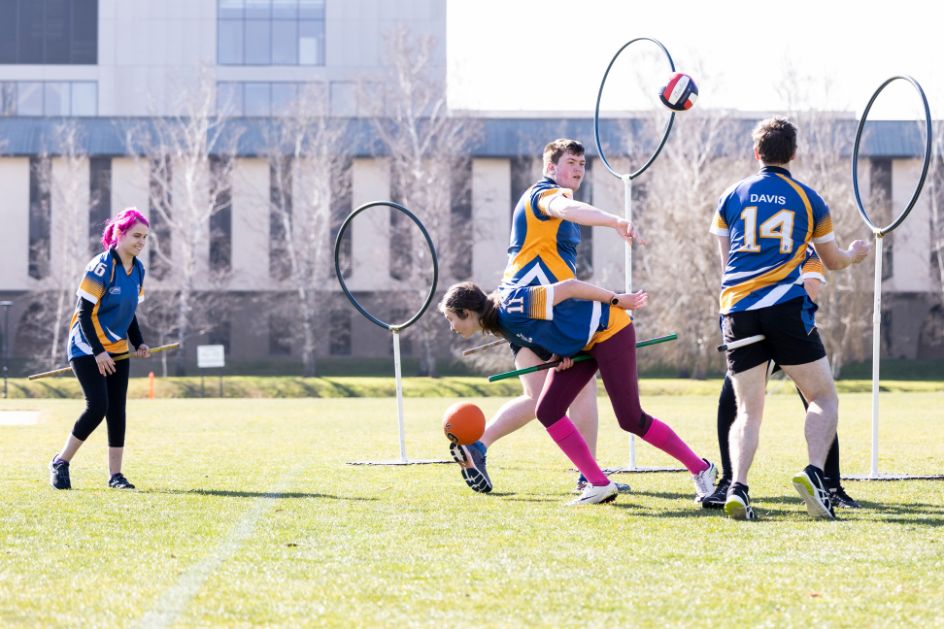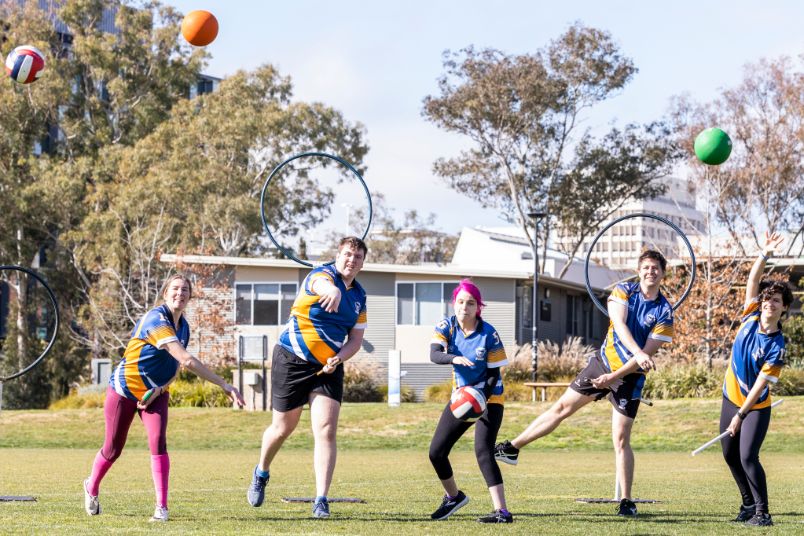The ANU Quidditch Club will next month belatedly launch their 2020 season and they want you to join them.
Yes, that’s right, ANU has a Quidditch Club, who play a modified ‘muggle-friendly’ version of the broomstick-based sport from Harry Potter.
In case you missed it, since being adapted to the real world in 2005, Quidditch has taken off as a niche sport across the world, with an International Quidditch Association (IQA), Australian national team – The Dropbears, and a biennial world championship that’s been running since 2012.
The ANU Quidditch Team, affectionately known as the Owls, are to date Canberra’s only Quidditch club, with membership available to all – no ANU enrolment or Harry Potter fandom necessary.
The sport was first played in Canberra in 2011 as part of the ANU Harry Potter Club.
In 2014, they split off to become the ANU Quidditch Club, operating as a student club before in 2015 affiliating with ANU Sport to become a legitimate sports club.
Owls president, coach and captain, Logan Davis, told Canberra Daily the club will be launching their come and try open trainings on Saturday mornings throughout August.
“It’s teaching people the basic rules and strategies, and then also just a mix of the social activities we do like team dinners or scavenger hunts on the weekend,” he said.
“We have a lot of people who come to us fresh with no moulding … we’ve got a really broad spectrum of skill levels who come to us.
“People who have played sports at national levels for years and years, and then people who have absolutely no idea, and we train people up … no one really comes in with the full skill set.”
Having been an Owl since 2015, Davis was chuffed to find the club during O-week after he struggled to set up a Quidditch tournament at his college in year 12.
“I saw the stall and went ‘oh, they’ve already organised it for me’,” he said.
In previous years, the Owls would play once a month against other sides in Sydney with around 12-15 sides year-round, and a representative season held around October.
“This year it’s a little bit more compressed … we’re now looking to play August or maybe a little bit later now to October,” Davis said.

How to play muggle Quidditch
The muggle game quite closely replicates Hogwarts’ inter-house sport of choice, just without the magic – i.e. no flying brooms or sentient snitches.
It’s seven-a-side, co-ed full contact sport where any team may not have more than four players who identify as the same gender in play at the same time – also, and this one’s important, your broom must always be kept between your legs while in play.
“If you don’t want to get tackled it’s pretty easy to avoid,” Davis said.
Points are scored by throwing the quaffle (a slightly deflated volleyball) through any of the three scoring hoops at either end, and if you’re hit by a bludger (a slightly deflated dodgeball) you have to run back to touch your side’s defensive hoops to be back in play.
After 18-20 minutes, a human snitch – a person from neither competing team wearing gold oztag shorts with a tennis ball held within a sock attached to the back of the shorts – enters the field.
It’s then up to the seekers to try and snatch the sock off the back of the shorts, and it’s up to the human snitch to make their job as difficult as possible.
That process alone can take anywhere from five seconds up to 40 minutes depending on the competency of both the seekers and the snitch.
A global game
The sport was adapted from the Harry Potter universe into our own in 2005 by a group of university students in Vermont. By 2007, the game had spread internationally, and the IQA was founded in 2010.
That same year UCLA became the first major university to create a permanent Quidditch pitch – still a pipe dream for the Owls.
The first Quidditch World Cup was played in 2012 amongst five nations, while the most recent fourth iteration was held in 2018 and saw 29 teams converge on Florence, Italy.
The Australian national team, the Dropbears, have competed in all four Quidditch World Cups, taking home the coveted world championship in 2016 with former ANU Quidditch Club member James Mortensen skippering that side.
So while it’s certainly a cult sport – current estimates from the IQA indicate there are around 8,000 to 9,000 players in almost 40 countries – it’s a very well organised sport that, when played at its highest level, is as competitive as it gets.
So whether you’re a mad Harry Potter fan, looking for a fun social sport, or fancy yourself a chance of leading the Dropbears to glory, grab a broomstick and try your hand at Quidditch at one of the Owls’ open training sessions, held Saturdays throughout August, 10.30-12.30am.



